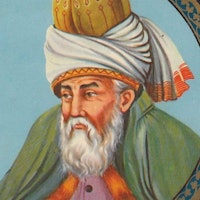Apprentice yourself … to a generous and righteous craftsman. Seek the pearl in the oyster shell … and seek craftsmanship from the skilled.
Jalaluddin Mevlana Rumi

The Garment of Humility
Topic: Temperance & Humility
THE GARMENT OF HUMILITY
The meanest earning that goes on in the world,
is it ever practiced without the guidance of a master?
It begins with knowledge and is followed by action
that it may yield fruit after a while or after death.
Apprentice yourself, O possessor of intelligence,
to a generous and righteous craftsman.
Seek the pearl in the oyster-shell, my brother,
and seek craftsmanship from the skilled.
If you meet sincere spiritual counselors,
deal fairly with them and be eager to learn:
don’t put on any airs.
If a tanner wears a threadbare coat,
that doesn’t diminish the master’s mastery;
if the blacksmith with massive biceps
wears a patched apron while flexing the bellows,
his reputation doesn’t plummet in people’s eyes.
So strip the raiment of pride from your body:
in learning, put on the garment of humility.
Jalal ad-Din Muhammad Rumi, born on September 30, 1207, and also known as Jalaluddin Mevlana (Mawlānā) Rumi, J. M. Rumi, or simply as Rumi in the Western world, was an extraordinary poet, philosopher, and Sufi mystic. He was a prominent figure in the Islamic world, born in the region of present-day Afghanistan, then within the greater Persian Empire, and later settled in Konya, present-day Turkey. Rumi's passionate love for humanity and his deep spiritual insights transcended geographical, linguistic, and cultural barriers, making his poetry and teachings resonate not only within the Islamic world but also with audiences globally.
Rumi's spiritual journey led him to develop a unique approach to Sufism that emphasized love, tolerance, and the pursuit of enlightenment. He created a fusion of traditional Islamic beliefs with mysticism, nurturing a school of thought that flourished in his followers. They established a sect known to the Western world as the 'Whirling Dervishes', a term derived from their mesmerizing practice of whirling as a form of physical meditation. The proper name for this branch is the Mevlevi order, dedicated to preserving and promoting Rumi's teachings.
In addition to being a mystic, Rumi was an accomplished scholar and theologian who left behind an impressive literary legacy. His best-known work, the Mathnawi or Masnavi, is a six-volume poetic epic that explores themes of love, divine mystery, and human connection to the spiritual world. Rumi's poetic style is marked by profound emotion and philosophical depth, weaving metaphors and allegory to create timeless pieces that continue to inspire readers today. Rumi's influence reaches far beyond his time, as his teachings on love, compassion, and unity continue to touch the hearts of millions, transcending barriers of religion, culture, and era.
Mathnawi
Rumi, Jalal al-Din, et al. The Rumi Daybook. Shambhala, 2012, p. 297 [Mathnawi V:1054-1061].

Jalaluddin Mevlana Rumi
Resources
Copyright © 2017 – 2024 LuminaryQuotes.com About Us

Mathnawi V:1054-1061
Love Makes All the Difference: An Introduction to Rumi, by Jason Espada
It’s with good reason that great works are always in season. I was reminded again today of just how troubled this world is, how dis-empowered. Rumi’s works seem to be, once again, just exactly the right antidote: a true scale of values, food, and light for our times.
I’ve seen how it’s out of overflowing fullness and satisfaction and gratitude that the wish to give to others comes about. And so, here at last, are my favorite works by Rumi. Share the joy.
–Jason Espada [My Favorite Rumi, presented by Jason Espada, A Buddhist Library website – pdf].
My Favorite Rumi [Link is under Resources]
To say that many of us don’t see this world as it is, would be a huge understatement, I know, but we have to start somewhere. For a lot of people, human beings are little more than animals, and life is mostly about struggle – it’s something to be gotten through, with only brief moments of light or happiness. Or else, there’s a quality of ‘nothing special’ about it, with no feeling one way or another.
The tragedy of course is that our experience here doesn’t have to be this way. There are a few other people who tell us that, far from being a burden, this life is something to be celebrated. There are people who say this world is Divine – that it can be an unending source of wonder and joy. What do you think?
Most people usually don’t see it this way, and so they take advantage of each other, they prey on each other, or else they waste time, or feel bored, or dissatisfied. This is all so common.
In the greatest contrast to the way most people experience this world, there are those who have found a deep source of nourishment in this life, such that everything they say, and everything they do comes out of that joy. Such people throughout time have been called ‘mystics’.
The 13th century Persian teacher and poet, Jelaluddin Rumi was one such person who was able to offer the world an inspiring vision, and also the guidance and encouragement to live from this realization. He tells us:
And he says:
And:
And:
–Jason Espada [My Favorite Rumi, presented by Jason Espada, A Buddhist Library website – pdf].
The Life of Rumi
Jalal ad-Din ar-Rumi was born 1207, in what is now Afghanistan. As a child, Rumi’s family traveled and settled in Turkey. Rumi succeeded his father as a Muslim teacher. Then, when he was 37 years old, Rumi met a mystic named Shams-I-Tabriz, and the two formed a deep spiritual relationship. Rumi’s students, it’s told, were jealous, and Shams disappeared, apparently killed out of jealousy.
Rumi grieved for his loss, having seen the Divine in Shams, or we can say having seen Shams as God, and as a doorway, to further understanding the mysteries of this life. In his grief, Rumi created the Turning Dance (called ’Whirling’) that is still a part of the Sufi Tradition today. The turning represents the search for Truth, the Beloved, the Divine, or God.
The Sufis are the mystics of Islam. The Sufi Path is sometimes called ‘The Path of Love’, or ‘The Way of Passion’, as love is such a strong element in their search for Truth, in their way of life, and their teaching.
Although they have some elements in common with more Orthodox Muslim traditions, the Sufis are also unique in some ways. They are not only looking for an intellectual understanding of the Divine – they aim for personal experience, and for union with this deep Truth, or with God. Another feature that stands out is that the Sufi’s love, for God, for the Divine, or for this life is often expressed in earthy, sensual language, like a lover speaking or writing to his beloved. And so their writing moves from the experiences of longing, to the joy at being touched, to those of fulfillment.
Rumi says:
And:
And:
In the translations that have reached the West, there are included many teaching stories that are meant to guide people to living more deeply. In addition to being beautifully expressed, there is a whole way of life described in these writings. Rumi describes how we can grow and develop as individuals, how we can learn to see, and to live more authentic lives; how we can find fulfillment. He describes many of the processes and obstacles that are a part of life – often in a humorous way, but always with compassion and respect for his listeners.
–Jason Espada [My Favorite Rumi, presented by Jason Espada, A Buddhist Library website – pdf].
A few additional quotes from Rumi:
And
–Jason Espada [My Favorite Rumi, presented by Jason Espada, A Buddhist Library website – pdf].